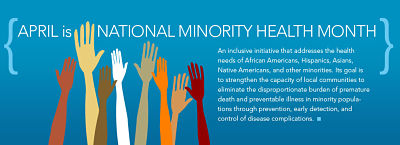
Prevention is Power: Join us in Taking Action for Health Equity
In April, we commemorate National Minority Health Month, a time to raise awareness about health disparities that persist among racial and ethnic minorities. This year’s theme - “Prevention is Power: Taking Action for Health Equity” - embodies the ambitious goal put forward by the U.S. Department of Health and Human Services (HHS) to achieve “a nation free of disparities in health and health care.”
Despite some recent progress in addressing health disparities, great challenges remain. Minorities are far more likely than non-Hispanic whites to suffer from chronic conditions, many of which are preventable. This is a particularly troubling statistic, because chronic diseases account for seven of the ten leading causes of death in our nation.
For example, African Americans, American Indians and Alaska Natives are twice as likely to be diagnosed with diabetes and Native Hawaiians and Pacific Islanders are more than three times as likely to receive the same diagnosis. And Latinos are twice as likely to die from liver cancer.
While these persistent disparities are deeply troubling, there are some hopeful trends. The gap in life expectancy between African Americans and non-Hispanic whites has been closing, and is now the smallest it’s been since these statistics have been tracked.
Additionally, seasonal flu vaccination coverage has tripled for children over the past four years and has contributed to a reduction in vaccination disparities among minority children.
Thanks to the Affordable Care Act, health coverage is now more affordable and accessible for millions of Americans, including minority groups. For minority populations, the law addresses inequities in access to quality and affordable coverage.
The impact of the Affordable Care Act on communities across our nation is transformative. Over seven million African Americans, nearly four million Asian Americans and Pacific Islanders, and over eight million Latinos with private insurance now have access to expanded preventive services with no cost sharing. This includes screening for colon cancer, Pap smears and mammograms for women, well-child visits, and flu shots for children and adults. Communities across the country are now stronger because the law invests in creating healthier communities, strong public health infrastructure, and preventing disease before it starts.
So please make sure you are following the best practice standards of care by seeing your doctor for regular visits and screening exams; eating a healthy, well balanced diet; getting plenty of exercise and reducing your stress level when possible.
To learn more about National Minority Health Month and what HHS is doing to achieve health equity, please visit www.minorityhealth.hhs.gov.


